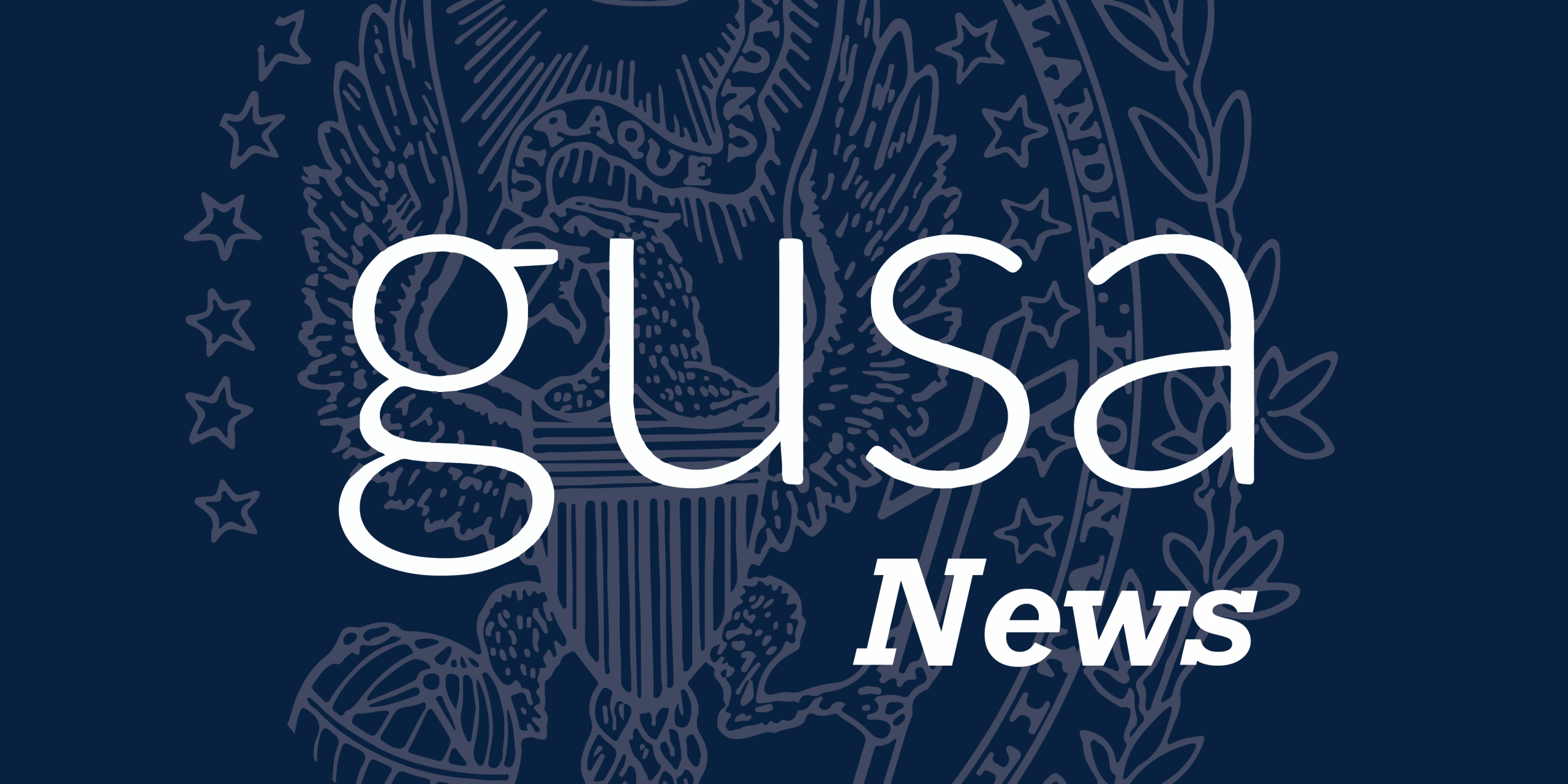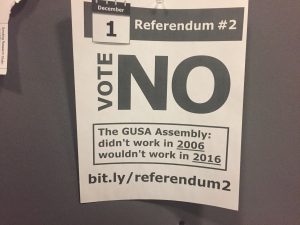On April 17, the Constitutional Council heard arguments on a case regarding the constitutionality of the 272 referendum that passed the student body on April 11.
Rowan Saydlowski (COL ’21) and Chris Castaldi-Moller (SFS ’21) filed a complaint on April 14, alleging that the results of the referendum must be invalidated due to its unconstitutionality.
In their complaint, made three days after the election, Saydlowski and Castaldi-Moller claim first that the former Ethics and Oversight committee chair, Dylan Hughes (COL ’19), had a significant conflict of interest and failed to recuse themselves; second that the Election Commission failed to properly oversee the election; and third that GUSA itself could not bring a non-amendment referendum forth as it is not explicitly allowed in the GUSA Constitution or Bylaws.
The proposal would create a $27.20 fee to be paid by students each semester, which would contribute to a fund to benefit the descendants of the 272 enslaved people Georgetown University sold in 1838. The referendum passed the GUSA Senate body with a two-thirds majority and passed the student body with 66.1 percent of the vote.
In the hearing, the complainants presented these allegations, and each accused party was given a chance to respond. Chief Justice William Morris (SFS ’19) presided.
Saydlowski opened by accusing the defendants of attempting to obstruct justice for their own interests. “They’re afraid, not of us, the plaintiffs, but of the students body,” he said. “They’re afraid of their true selves being revealed.”
Saydlowski argued that Hughes had an interest in seeing the referendum pass, as they had co-sponsored the legislation and made a comment on Facebook in support of the referendum. There was no way to ensure all complaints were being referred, he said. Since Hughes was a supporter and in charge of referring election complaints to the Election Commission, Saydlowski claimed there was a conflict of interest. He suggested Hughes should have recused themselves, and someone else on the committee should have stepped forward to oversee the election.
Castaldi-Moller said it did not matter if Hughes’ actions actually affected the election. “Even if it didn’t change one vote, it was still profoundly important and critical,” he said.
Hughes responded that they had met the ethical standards of their position. While they are barred from participating in any executive election, this is not true for a referendum. Hughes also said they did not violate the spirit of the law, as their only contribution, both as a co-sponsor and on Facebook, was helping to draft and explain the organization of the board that would oversee the funds. Hughes says this was not directly advocating for the referendum but rather improving the structure in the event it was passed.
Additionally, Hughes assured the council they had forwarded all the complaints they received, which totalled two. The other members of the Ethics and Oversight committee were also allowed to receive complaints about the process of the referendum. Neither Saydlowski nor Castaldi-Moller filed such a complaint.
Hughes called the case an attempt at defamation, saying, “I wonder if the complaint is grasping at straws in an attempt to foil what is otherwise a clear democratic quorum.”
The second section of the complaint dealt with the conduct of the Election Commission through the referendum process, which Saydlowski claims invalidates the results.
First, he said the commission’s communication through a Twitter account, rather than by email, prevented the entire student body from receiving election updates. He also alleged that the numerous changes to the voting threshold, from twenty five percent voting, to twenty five percent voting yes, to a simple majority, confused students. He was especially concerned about those in the opposition, who may have thought it was in their interest not to vote in order to keep the threshold from being reached. Additionally, Saydlowski said that the simple majority threshold for a referendum to pass could not be found in the GUSA Bylaws or Constitution, and thus was unconstitutional.
Kareeda Kabir (COL ’20), one of the election commissioners, responded that the worry about abstention did not correspond with the numbers, as this election saw one of the highest turnouts in GUSA history. She also argued that the commission has used Twitter as a means of communication since 2011, adding that their tweets about the election received over 100,000 impressions, indicating a large audience.
While the commission prefers to communicate by email, they rely on the Center for Student Engagement to do so, which was closed at the time the tweets were sent.
Additionally, Saydlowski said the commission failed to respond to allegations of electoral misconduct relating to the proponents of the referendum, especially violations of residential living policies, like having no more than two campaigners per campaign, and no door-to-door distribution of campaign materials. This was reported to the Election Commission in the form of a sign-up sheet to canvass in favor of the referendum, which included names of canvassers and times.
Another member of the commission, Justin Rich (SFS ’22) said the two-person limit referred to candidates, not members of the student body, and that those advocating for the referendum were not candidates. A previous Constitutional Council ruling in 2017, Angelini et al v. GUSA, ruled that referendums are not the same as candidates, and that the same rules do not apply.
Rich also addressed the canvassing, saying that the commission reminded the campaign of the rules, and that the spreadsheet sent to the commission did not constitute enough evidence that rules were being broken. There was also no way to confirm the people who signed up on the spreadsheet had actually canvassed residence halls at these times.
Finally, the complainants alleged that the fact that the voting guide created by the Election Commission did not include the charter of the board that would oversee the fee meant that voters were not given complete and unbiased information.
Chase Wagers (COL ’20), a member of the Election Commission, argued the guide was actually more comprehensive than was required, and that the commission provided the entire text of the referendum, though they were not obligated to. The guide included a link to the charter for the board. On the issue of bias, he said, “There’s no evidence which proves election commission did not act impartially.”
The third component of the complaint was that GUSA as an institution has no ability to conduct a referendum not regarding a constitutional amendment. Castaldi-Moller referred to the fact that neither the GUSA Constitution or Bylaws have a specific provision for a non-amendment or issue referendum. He argued that this could have been included in the bylaws, but was not, implying they should not be conducted.
Norman Francis Jr (COL ’20), President of GUSA, responded that allowing one type of referendum does not make other types inadmissible, and that according to the constitution, “students have a right to play a clearly defined role” in the policy making process.
An amicus brief filed by alumni points out that GUSA has conducted several non-amendment referendums in the past, none of which have been invalidated. “Not only does the GUSA Constitution permit referenda for other purposes, but such referenda have traditionally been an important way for GUSA to assert students’ right to play a role in institutional policymaking, as envisioned by GUSA’s founding documents,” the brief reads.
Juan Martinez (SFS ’20), transition Chair of the Senate, argued that the Council would be legislating from the bench if they struck down this referendum despite the precedent.
Morris ended the hearing by requesting more documents and evidence from both sides. He said a ruling will be released as soon as possible, though the council is not required to rule for ten class days.





